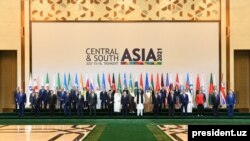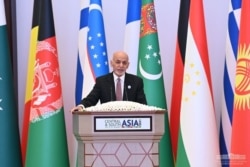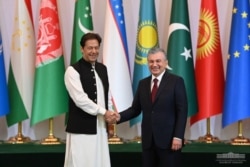Dreams of connecting landlocked Central Asia more closely to South Asia and the international trading system are coming into focus after a two-day conference last week in Tashkent, hosted by Uzbek President Shavkat Mirziyoyev.
Nearly 50 countries and more than 30 international organizations attended, including China, Russia, the United States, and the European Union. The gathering was perhaps the largest yet to promote economic integration. Still, experts caution that high-level engagements must translate into tangible investments in order to deliver economic benefits.
Mirziyoyev said that strengthening ties with neighbors is a top priority for Uzbekistan, “a reliable, stable, and predictable partner, interested in and committed to constructive cooperation based on mutual interests.”
Evoking common history and values, Mirziyoyev urged closer partnerships. “Without tighter relationships and economic connectivity, we cannot turn this part of the world, and the Eurasian continent, into a stable and prosperous space.”
Edward Lemon of Texas A&M University says Mirziyoyev’s “activist foreign policy” can help to expand trade by reopening borders and addressing “regional problems, most notably the challenging situation in Afghanistan.”
Secretary-General António Guterres said the United Nations will support these efforts, since connectivity is essential to trade, growth, and sustainable development.
“But connectivity is not just about economics. It drives regional cooperation and encourages friendly relations among neighbors,” Guterres told the conference during a video appearance.
“This places an even higher premium on the importance of active and collective engagement in support of Afghanistan’s peace and security.”
Afghan President Ashraf Ghani is in an increasingly precarious spot in the face of a Taliban march toward Kabul. But he flew to Tashkent to stress that “a political settlement to the conflict has been our national priority. A sovereign, united, democratic, peaceful and connected Afghanistan has been endorsed internationally and regionally.”
Ghani called for urgent steps to forge a regional consensus. “Please approach Afghanistan from the perspective of our potential as an Asian roundabout, where for millennia we have functioned as a hub for flows of civilizations, cultures, goods, ideas and people.”
Pakistani Prime Minister Imran Khan signed deals with Uzbekistan worth $500 million, covering trade, transit, visas, security and cultural cooperation. “With large populations and rich natural resources, Central and South Asia can create a giant market of products and services,” he said.
Lemon pointed to the potential benefits of new transport corridors offering landlocked Central Asia access to seaports and the South Asian consumer market of more than 1.5 billion people, while facilitating exports of energy.
“Trade with India, Pakistan and Afghanistan is still minuscule in comparison to Central Asia's trade with China, Russia and the EU,” he said.
Tashkent and Islamabad have high hopes for a proposed rail line running from Termez in southern Uzbekistan through the Afghan cities of Mazar-i-Sharif and Kabul to Pakistan’s Peshawar and on to its Arabian Sea port cities of Karachi, Gwadar, and Bin Qasim.
Josep Borrell, EU high representative for foreign affairs and security policy, also spoke, stressing Central Asia’s strategic position between Europe and South Asia.
“Connectivity, stability and security are prerequisites for each other. The EU strongly supports the new spirit of cooperation in Central Asia, which contributes to shaping its own connectivity agenda,” Borrell tweeted from Tashkent.
The Washington-led C5+1 forum with Uzbekistan, Kazakhstan, Kyrgyzstan, Tajikistan, and Turkmenistan also convened in Tashkent on July 15, affirming its commitment to strengthen trade, transport, and energy links. The group also stressed the need for security and stability through Afghan peace negotiations.
Evan Feigenbaum of the Carnegie Endowment oversaw American policy toward Central Asia during the George W. Bush administration, a period when Washington actively promoted connectivity between the two regions. He praised Tashkent’s efforts but noted that prior initiatives over the past 30 years often fell short. One reason, he said, was Uzbek opposition, so Tashkent’s change of heart is a meaningful shift.
But Feigenbaum sees other obstacles: Private capital flows fell sharply between 2015 and 2018, and few of those flows ever reached Central Asia. Foreign direct investment to developing countries has also slackened in recent years.
Washington wants to mobilize mainly private capital but much of this cross-border finance is flowing to other regions instead. That is one reason, he said, that China, which has pumped billions into the region, mostly on a bilateral basis, is a bigger player.
Conference participant Frederick Starr, chairman of the Central Asia-Caucasus Institute in Washington, argued in a July 12 Wall Street Journal op-ed that “preventing any country from dominating the heart of Eurasia should be a goal of American grand strategy.”
He and co-author Mike Doran of the Hudson Institute write that China, Russia and Iran are exploiting the U.S. withdrawal from Afghanistan to convince Central Asian leaders that America and the West are a spent force.
“Central Asia is … a geostrategic unit whose orientation will have a profound impact on the global balance of power. Washington’s goal should be to enable all the region’s states, including Afghanistan, to maintain balanced relations among the major powers.”
In a July 9 piece in The National Interest, Starr and Uzbek co-author Eldor Aripov, head of the leading state think tank, called for a C6+1, adding Afghanistan.
Jennifer Murtazashvili of the University of Pittsburgh noted that “hopeful momentum for regional integration now comes mainly from regional countries, not outside powers.”
For Murtazashvili, a true “new Silk Road” must be spurred from inside, not outside, the region. Yet it is outside powers that have the capital to invest.
For that reason, she said, a “credible commitment by Tashkent to deepen reforms is crucial.”
A commitment from Kabul is also essential, said Lemon, because while “connectivity is being touted as a means to stabilize Afghanistan, roads, rails, and pipelines won’t even be built without stability.” Afghanistan faces a chicken-and-egg problem: no stability, no investment; but investment could help bring stability.


